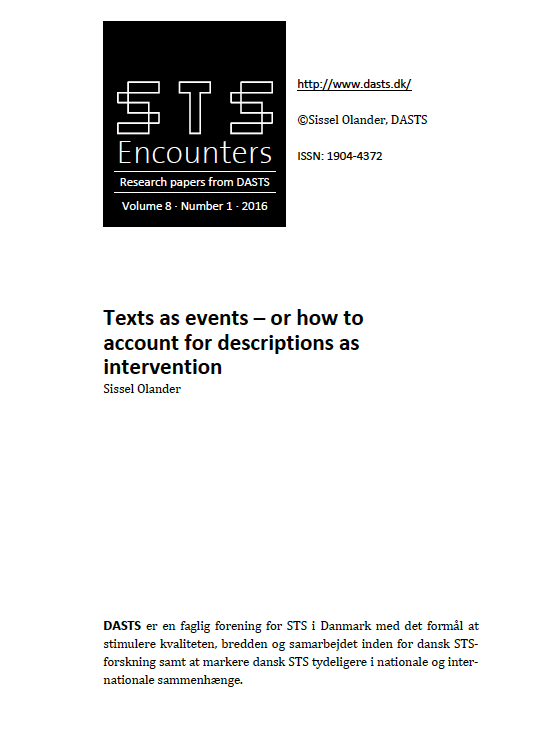Texts as events – or how to account for descriptions as intervention
DOI:
https://doi.org/10.7146/stse.v8i1.135234Abstract
From the introduction:
In this article I problematize how texts are sometimes cast as potent interventionists in cultural-analytical and constructivist social research. I engage with two different articles, which discuss texts as interventions. One is an article by Signe Vikkelsø titled: “Description as Intervention - Engagement and Resistance in Actor-Network Analyses” (2007). The other is an article by Brit Winthereik and Helen Verran titled “Ethnographic stories as Generalisations that Intervene” (2012). In both articles the authors propose strategies for writing up accounts. The purpose of these proposed strategies is to induce the text with certain qualities, in order to enhance the interventionist powers of the texts. I will inspect these strategies as particular research set-ups, and challenge how the process of writing up the analysis and account is continually conflated with claims about how the text will intervene in some more or less specified future. I do so by exploring descriptions and texts as events, and by inspecting the proposed research strategies as if they were in fact experimental research set-ups. To this end I draw on prevailing ideas about the relation between program and experiment in constructive design research, and on the work of philosopher of science Hans-Jörg Rheinberger.

Downloads
Published
How to Cite
Issue
Section
License

This work is licensed under a Creative Commons Attribution-NonCommercial-ShareAlike 4.0 International License.
Starting with volume 15, articles published in STS Encounters are licensed under Attribution-NonCommercial-ShareAlike 4.0 International (CC BY-NC-SA 4.0). The editorial board may accept other Creative Commons licenses for individual articles, if required by funding bodies e.g. the European Research Council. Previous articles are not licensed under Creative Commons. In these volumes, all rights are reserved to the authors of the articles respectively.




